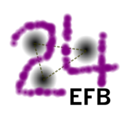Speaker
Description
Artificial Neural Networks (ANNs) have recently been used to solve a variety of quantum few- and many-body problems [1,2]. ANNs efficiently encapsulate information of the wavefunction and can be used to effectively solve variational problems [3]. I will discuss an implementation of these methods to solve a benchmark nuclear physics problem – the ground state of the deuteron [4]. I will describe the ANN architecture, training, and energy minimisation algorithm that is used in this first application to theoretical nuclear physics. I will then consider the extension to higher mass numbers, and identify challenges in the use of ANNs for nuclear theory applications.
[1] – G. Carleo and M. Troyer, Science 355, 602 (2017) doi:10.1126/science.aag2302
[2] – H. Saito, J. Phys. Soc. Jap. 87, 074002 (2018), doi:10.7566/JPSJ.87.074002
[3] – V. Dunjko and H. J. Briegel, Rep. Prog. Phys. 81, 074001 (2018) doi:10.1088/1361-6633/aab406
[4] – V. G. K. Stoks, P. C. van campen, W. Spit and J. J. de Swart, Phys. Rev. Lett. 60, 1932 (1988) doi:10.1103/PhysRevLett.60.1932
